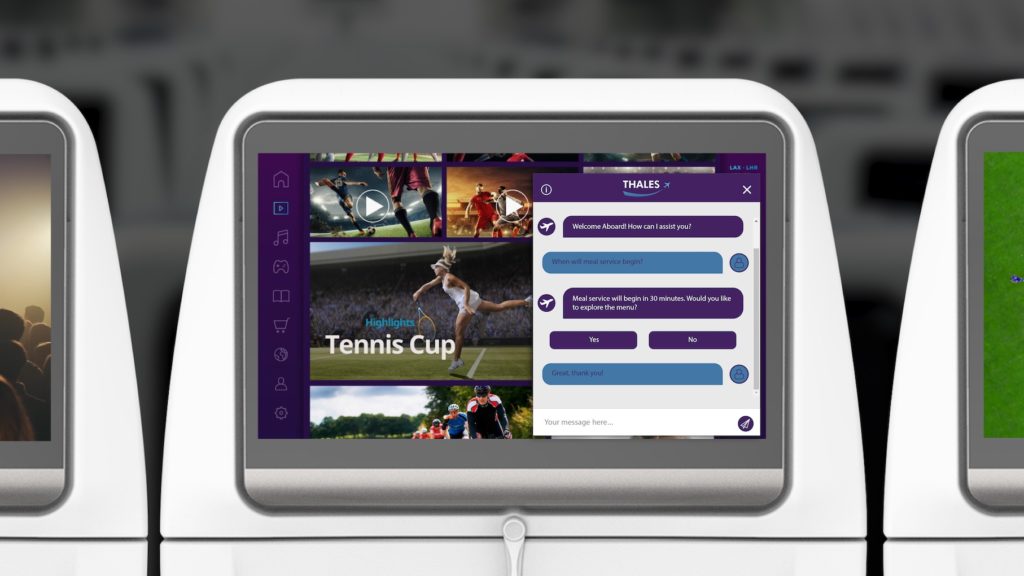ICM Hub looks to take passenger-airline interaction to the next level with Conversational AI
Share
New York-based startup ICM Hub was founded with the aim or reshaping how passengers and airlines interact inflight. Partnering with Thales via their forward-looking Digital Accelerator program, ICM Hub showcased their latest Conversational AI solution at the recent APEX/IFSA EXPO in Long Beach. APEX Media sat down recently with ICM Hub Co-Founder and CEO, Alexander Tange, to learn more.

APEX Media: ICM Hub has been helping airlines automate the passenger experience through chatbot technology, but the Conversational AI solution you’re showcasing is a little bit different. Talk to me about that.
ALEXANDER TANGE: We offer Conversational AI for airlines pre-flight, in-flight and post-flight. Our classical solution is cloud-based which means that passengers can self-serve, guided with conversational AI, to get answers.
Our newest product does the same thing, but in-flight. The main problem in-flight is when there is no connectivity, but all chatbot and Conversational AI solutions require the cloud. So we changed our Natural Language Processing (NLP) algorithms to be locally-hosted on the aircraft. Which we think will really change the way airlines communicate with their passengers in-flight.
Think of it like the flight attendant call button, for example. If passengers push that button, the cabin crew gets no information and they cannot differentiate whether this is a life and death situation or if the passenger is simply asking for a pillow.
APEX: Sure.
TANGE: With our new solution, passengers can use an app on their PED – or potentially their seatback screen – and use natural language to make their request. It’s like texting a friend, you simply talk to it and the request is sent.
APEX: I imagine that would be kind of a game-changer for flight crews as well.
TANGE: Absolutely. It’s what we call a triple win. The airlines gain new opportunities for increased onboard sales because passengers no longer have to wait for attention but can simply log in their orders for drinks or any other items — duty free shopping, Wi-Fi packages, etc..
Passengers like this solution because it elevates their service and is easier for them to use. And it’s beneficial to crew members as well because it streamlines their workflow — by saving them a few trips up and down the aisles, educating passengers about the menu, etc.. Transactions can now be done almost entirely via chat, so the crew gets a notification and fulfills the order.

APEX: How deep can the requests go? For instance if a passenger has a very specific drink request or something?
TANGE: So let’s say you express your concern: ‘I’m thirsty, I need a drink.’ It could respond with something like: ‘Great, we have the following options available.’ You know, would you like alcoholic? Non-alcoholic?
APEX: So it’s kind of multiple choice?
TANGE: No, it’s pure, natural language. It’s as if you’re talking to a friend. We can make it multiple choice if that’s what our airline customers prefer, but it’s more like an Amazon or Google chatbot, you know? Totally conversational.
APEX: And does it also offer passengers the ability to quantify their requests? For instance, if there is an actual emergency or they need something right away?
TANGE: I think airlines could keep the flight attendant call button for really urgent requests. But what’s nice about our solution is that it’s simple and easy to use. The passenger logs their order and all the flight crew sees on their end is that seat 23B ordered a Coca Cola or a snack box and it’s already paid for. So, whenever it’s convenient and most efficient for them, the crew can bring the order directly to the passenger’s seat.
APEX: Sounds like a good solution for post-pandemic passengers who might still be a little skittish about flying.
TANGE: Definitely. We were already working in the space on Conversational AI for airlines on pre-flight and post-flight solutions but we didn’t have access to in-flight. COVID made it more pressing because everyone was talking about contactless travel, keeping a safe distance from the cabin crew, etc.. So we looked into that and we came through the Thales Digital Accelerator. Thales was our first partner, so they also pushed us a little bit in this direction. And then we basically made it possible for our solution to be hosted onboard.
APEX: Nice. So is it flying anywhere yet?
TANGE: Not yet. We launched our first prototype here at the EXPO, and showcased it very successfully to a number of airlines. I would say there’s been some interest from maybe half a dozen carriers and we have two airlines who are very interested right now. So, check back with me in a few months!


